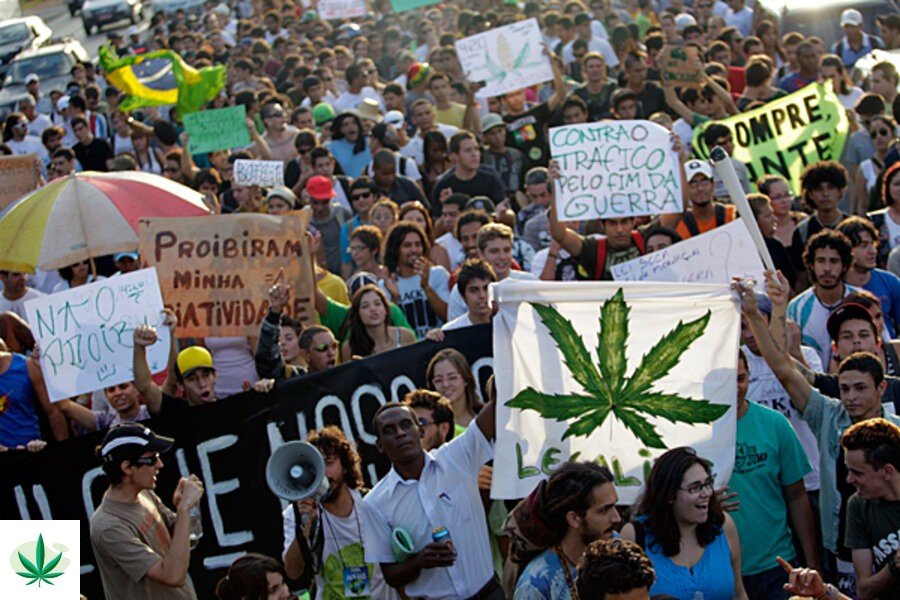In recent times, Brazil has witnessed a groundswell of public support for the legalization of marijuana. As thousands of individuals took to the streets to express their discontent with racist drug laws and advocate for change.
The demonstration, which attracted widespread attention, highlighted the urgent need for a shift in drug policies to address systemic inequalities. Also, promote social justice. This article delves into Brazil’s remarkable protest movement. Exploring the motivations behind it and the potential impact it could have on the nation’s drug legislation.
The March for Legalization of Marijuana
On Saturday, May 6 , Brazilian cities echoed the resounding demands of protesters. Who came together under the banner of marijuana legalization and the fight against racist drug laws. The demonstration, organized by various grassroots organizations and advocacy groups. They drew participants from diverse backgrounds who shared a common belief in the need for comprehensive drug policy reform. One such event, covered by Left Voice, sheds light on the powerful movement calling for the legalization of marijuana. With an end to the systemic racism embedded in Brazil’s drug laws.
Motivations and Demands
The protesters’ motivations stemmed from a recognition of the deeply entrenched racial and social injustices perpetrated by Brazil’s current drug laws. The existing legislation disproportionately targets and criminalizes marginalized communities. Which is exacerbating social inequality and fueling racial discrimination. With the aim of rectifying this systemic injustice. The marchers demanded the following:
Advocates argued that legalizing marijuana would not only address issues of personal freedom and individual rights. With present an opportunity for economic growth and the creation of a regulated industry that could generate jobs and tax revenue. Also, The protesters called for the decriminalization of drug use. Particularly in cases where individuals possess small amounts of marijuana for personal use. They also demanded amnesty for individuals serving sentences related to non-violent drug offenses.
Racist Drug Laws: A Catalyst for Change
Brazil’s drug laws have long been criticized for their racially discriminatory nature. Black Brazilians, particularly those living in marginalized communities, are disproportionately affected by harsh drug policies. The prohibition of marijuana has not only fueled the growth of an underground market but has also perpetuated racial profiling and police violence. These systemic injustices have sparked outrage among activists, leading them to mobilize and demand an overhaul of Brazil’s drug legislation.
Legalization of Marijuana: Impact and Implications
The sheer magnitude of the protest and the diverse cross-section of society represented sent a powerful message to policymakers and the public alike. Brazil’s drug policy reform movement gained significant traction. Which is putting pressure on lawmakers to address the urgent need for change. The protest served as a catalyst for public discourse surrounding the implications of marijuana legalization and the racial biases within drug laws.
Furthermore, the demonstration sparked a wider conversation about the war on drugs and its adverse effects on society. It encouraged critical examination of the social, economic, and health-related consequences of current drug policies, laying the groundwork for evidence-based alternatives that prioritize harm reduction, public health, and social justice.
Brazil’s march for the legalization of marijuana and against racist drug laws marked a turning point in the nation’s drug policy landscape. The demonstration, which brought together thousands of passionate advocates, underscored the urgent need for comprehensive drug policy reform that addresses racial disparities and promotes social justice.
As the movement gains momentum, it is crucial for policymakers to heed the calls for change and take meaningful steps toward legalising marijuana, decriminalising drug use, and rectifying the systemic injustices ingrained within Brazil’s current drug laws. By doing so, Brazil has the potential to set a transformative example for drug policy reform, one that prioritises individual rights, social equity, and public health.


